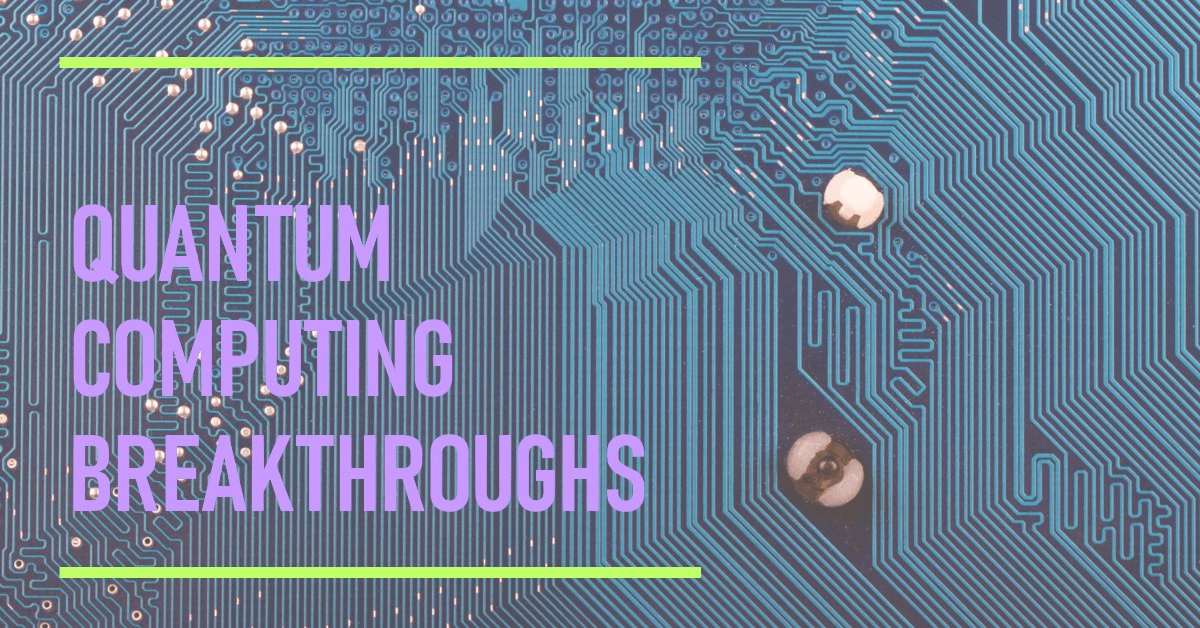Quantum computing, a revolutionary technology with the potential to outperform classical computers by solving complex problems in seconds, has garnered significant attention in recent years. With 2024 on the horizon, new breakthroughs in quantum computing promise to reshape industries like finance, cryptography, and artificial intelligence (AI). In this article, we will delve into the latest advancements in quantum computing and explore its potential impact on these key sectors.
The Current State of Quantum Computing
In 2023, quantum computing witnessed several milestones. Companies like IBM, Google, and Honeywell continued to push the boundaries of quantum technology, developing more stable qubits, enhancing quantum error correction techniques, and scaling quantum computers to tackle more complex problems. IBM’s Quantum System One, Google’s Sycamore processor, and the advancements in superconducting qubits represent significant strides toward achieving quantum supremacy—the point at which quantum computers outperform classical machines.
Quantum Computing in 2024: Key Breakthroughs to Watch For
As we step into 2024, several promising developments are expected to accelerate the quantum revolution:
1. Improved Qubit Stability and Error Correction
One of the biggest challenges facing quantum computing is qubit stability. Unlike classical bits, qubits are prone to decoherence, which leads to computational errors. In 2024, we expect further progress in stabilizing qubits through advanced quantum error correction techniques. IBM’s Quantum Volume metric, which measures the capability of quantum systems, is likely to see substantial growth, leading to more reliable and accurate quantum computations.
2. Quantum Hardware Advancements
Quantum hardware continues to evolve, with innovations in superconducting qubits, trapped ions, and photonic systems. In 2024, quantum processors with over 1,000 qubits are anticipated, a significant leap from the current state. This scaling up will enable more complex quantum algorithms to be executed, paving the way for practical applications in industries like finance, cryptography, and AI.
3. Quantum Software and Algorithms
Quantum computing isn’t just about hardware; advancements in quantum algorithms are equally critical. In 2024, we expect the development of more efficient quantum algorithms that can solve real-world problems. Quantum software companies such as Xanadu, Rigetti Computing, and Qiskit are working on improving quantum programming languages and creating user-friendly platforms that allow industries to harness the power of quantum computers without needing in-depth knowledge of quantum physics.
The Impact of Quantum Computing on Key Industries
The implications of quantum computing stretch across various sectors, but three areas where its impact will be particularly profound are finance, cryptography, and artificial intelligence.
1. Quantum Computing in Finance
In the finance industry, quantum computing promises to revolutionize everything from portfolio optimization to risk management and fraud detection. Classical computers struggle with simulating complex financial models, especially in real-time. Quantum computers, with their ability to process massive amounts of data and perform complex calculations simultaneously, can offer:
- Improved Financial Modeling: Quantum computing can significantly enhance the accuracy of financial models, allowing institutions to better predict market movements and optimize portfolios. With quantum algorithms such as the HHL algorithm, quantum computers can solve linear equations faster, improving decision-making in areas like asset pricing and derivatives valuation.
- Risk Management: Quantum computers can quickly analyze vast amounts of market data, identifying patterns that classical computers would take years to detect. This can lead to more effective risk management strategies and early detection of market risks.
- Algorithmic Trading: Quantum computing will enable traders to develop more complex algorithmic trading strategies, potentially maximizing returns by identifying arbitrage opportunities faster than competitors using classical systems.
2. Quantum Computing and Cryptography
One of the most discussed impacts of quantum computing is on cryptography. The encryption algorithms that secure the internet today, such as RSA and ECC, rely on the difficulty of factoring large numbers—a problem classical computers cannot solve efficiently. However, Shor’s algorithm, a quantum algorithm, can solve this problem exponentially faster.
- Quantum Threat to Current Encryption: As quantum computing advances, experts predict that it could break widely-used encryption methods within the next decade. In 2024, we can expect increased efforts to develop post-quantum cryptography, a new generation of cryptographic algorithms designed to withstand quantum attacks.
- Quantum Key Distribution (QKD): On the flip side, quantum computing also offers new methods of securing communications. QKD is a technique that uses the principles of quantum mechanics to create unbreakable encryption keys. As this technology matures, it could provide a level of security that is impossible to breach, even with quantum computers.
3. Quantum Computing and Artificial Intelligence
The synergy between quantum computing and artificial intelligence (AI) could be transformative. Quantum computers have the potential to supercharge AI by accelerating machine learning algorithms, improving data processing, and enhancing pattern recognition.
- Faster Machine Learning: Quantum computers can process vast amounts of data much more quickly than classical computers, which is crucial for training complex machine learning models. For instance, quantum machine learning (QML) could revolutionize industries like healthcare by improving predictive modeling for disease diagnosis and drug discovery.
- Optimization in AI: Many AI problems involve optimizing functions—whether it’s training neural networks or optimizing supply chains. Quantum computers excel at solving optimization problems, potentially leading to breakthroughs in AI research and applications across industries.
Quantum Computing in India: 2024 Prospects
India is making significant strides in the quantum computing space. The Indian government’s National Mission on Quantum Technologies and Applications (NM-QTA), launched in 2020, is set to receive a boost in 2024, with increased investments in research and development. Indian companies and academic institutions are also collaborating with global leaders to develop quantum technologies.
External Link: Explore India’s National Quantum Mission
Challenges Ahead
Despite the promising developments, there are still considerable hurdles to overcome. Scalability remains a major challenge, as current quantum computers can only handle a limited number of qubits. Additionally, decoherence and error correction issues need to be resolved before quantum computers can operate reliably on a large scale.
Moreover, industries need time to adapt to quantum technologies. Training talent, developing quantum-friendly infrastructure, and creating real-world applications will take time, even as breakthroughs continue.
Internal Link: Read more about Emerging Technologies in India
Conclusion
Quantum computing in 2024 is set to make significant progress, with improvements in qubit stability, quantum algorithms, and hardware scaling. The potential impact on industries like finance, cryptography, and AI is immense, offering new ways to solve complex problems and enhance current systems. While challenges remain, quantum computing is undeniably inching closer to practical, real-world applications that could revolutionize the global economy.
As we watch these developments unfold, businesses should begin preparing for the quantum revolution by investing in quantum research, developing partnerships, and staying informed about the latest advancements.
For more updates on quantum computing and technology trends, stay tuned to our Science and Technology section.










